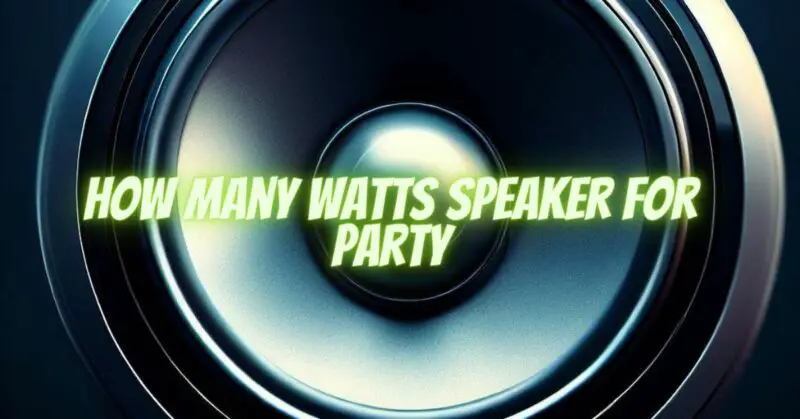Throwing a party that leaves a lasting impression on your guests requires careful planning and attention to detail. Among the essential elements of a successful party is an impressive sound system that can set the mood, elevate the atmosphere, and get everyone on their feet. But how do you determine the ideal number of watts for your party speakers? In this article, we will explore the factors that influence this decision and guide you towards creating an immersive auditory experience that will keep your guests talking long after the party is over.
Understanding Speaker Wattage:
Speaker wattage refers to the amount of power a speaker can handle and deliver to produce sound. It plays a crucial role in determining the speaker’s volume, clarity, and overall performance. Contrary to popular belief, the wattage alone is not the sole indicator of a speaker’s capability. Factors like speaker sensitivity, impedance, and the size of the venue also play a significant role in how the speakers will perform.
Consider the Venue Size:
One of the most important factors in choosing the appropriate wattage for your party speakers is the size of the venue. A smaller indoor space will require fewer watts to fill it with sound compared to an outdoor area or a larger hall. For small gatherings at home or intimate venues, speakers with a lower wattage (e.g., 50-100 watts) may be sufficient. For larger outdoor gatherings or sizeable indoor halls, you might need speakers with a higher wattage (e.g., 200-500 watts) to ensure that the sound reaches all corners of the space without distortion or loss of volume.
The Importance of Speaker Sensitivity:
Speaker sensitivity, measured in decibels (dB), determines how loud a speaker can be at a given wattage. Higher sensitivity speakers require less power to produce the same volume as lower sensitivity speakers. Therefore, if you have high-sensitivity speakers, you can get away with lower wattage while still achieving a loud and clear sound. Conversely, low-sensitivity speakers may require more wattage to reach the desired volume levels.
Matching Amplifiers and Speakers:
To ensure the best performance from your speakers, it’s essential to match them with an appropriate amplifier. An amplifier that provides enough power to drive the speakers optimally will lead to better sound quality and prevent potential damage to the speakers. When choosing an amplifier, consider its power output and impedance compatibility with the speakers you intend to use.
Additional Speaker Considerations:
Besides wattage, other speaker specifications and features can significantly impact your party’s sound quality. Look for speakers with a wide frequency response range, which ensures that both low and high-frequency sounds are reproduced accurately. Also, consider the speaker’s dispersion pattern – how it spreads sound throughout the venue. Some speakers have a narrow focus, while others provide a more widespread coverage, making them suitable for different types of parties and venues.
In the pursuit of throwing a memorable party, a quality sound system is indispensable. Understanding the relationship between speaker wattage, venue size, and speaker sensitivity is crucial to making the right choice for your specific event. Smaller gatherings in intimate settings may require lower wattage speakers, while larger parties in more extensive venues demand higher wattage for optimal sound distribution. Additionally, pairing speakers with the right amplifier and considering other speaker specifications will further enhance your party’s auditory experience. By carefully considering these factors, you can create an immersive atmosphere that captivates your guests and ensures that your party will be the talk of the town for years to come.


